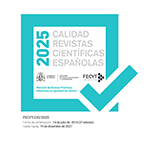“We All Make Mistakes!”. Analysing an Error-coded Corpus of Spanish University Students’ Written English
Abstract
The present study analyses the errors identified in the written argumentative texts of 304 Spanish university students of English taken from two different corpora –one from a technical university context and the other from learners enrolled in the Humanities. Considered an important design criterion for computer learner corpora studies, the metadata of the students’ was recorded and their competence levels were measured using the Oxford Quick Placement Test. The scores obtained (0 to 60) were then related to the CEFR (Common European Framework of Reference for Languages) levels ranging from A1 to C2.
Within the field of applied linguistics and language teaching/learning, many studies have been carried out over the years designed to address the phenomenon of interlanguage errors made by learners of English (Dusková 1969, Green & Hecht 1985, Lennon 1991, Olsen 1999, among many others). These studies involved analyzing a small number of texts with a limited number of tags, based on either linguistic taxonomies or surface structure categories of errors (Dulay, Burt, & Krashen 1982). However, in the last three decades, technological advances have been made which have facilitated the analysis of much larger amounts of data using computers for both the development of learner corpora and programs for a more detailed analysis of the learner data.
The error coding system used in the present research work has been designed to address all the possible levels of error (with as many sub-categories as required) since learners writing in a foreign language not only make errors related to grammar and vocabulary, but also with regard to their competence in the use of syntax, discourse relations and pragmatics, among others.
The aim of the present study is two-fold. Firstly, we explore the nature of the errors coded in the corpus i.e. which errors are most frequent, including not only the main categories but also the most delicate levels of errors. Secondly, we address the question of the relationship, if any, of the learners’ competence levels and the type and frequency of the errors they make. The results show that grammar errors are the most frequent, and that the linguistic competence of the learners has a lower than expected influence on the most frequent types of errors coded in the corpus.
Downloads
Article download
License
In order to support the global exchange of knowledge, the journal Complutense Journal of English Studies is allowing unrestricted access to its content as from its publication in this electronic edition, and as such it is an open-access journal. The originals published in this journal are the property of the Complutense University of Madrid and any reproduction thereof in full or in part must cite the source. All content is distributed under a Creative Commons Attribution 4.0 use and distribution licence (CC BY 4.0). This circumstance must be expressly stated in these terms where necessary. You can view the summary and the complete legal text of the licence.









